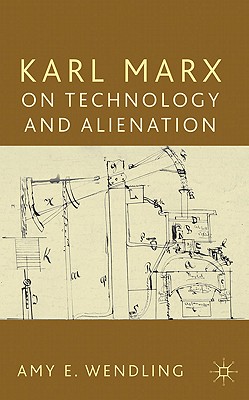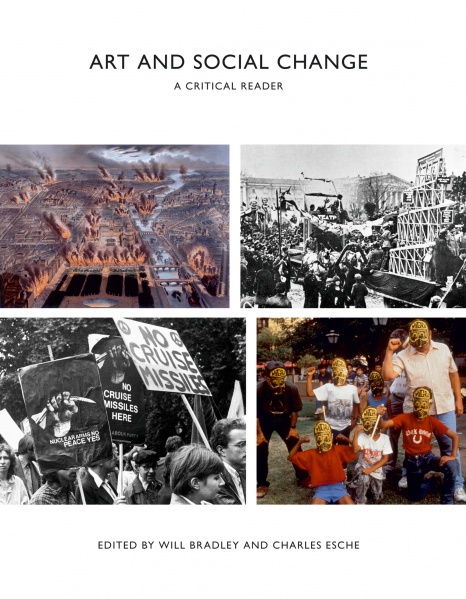Amy E. Wendling: Karl Marx on Technology and Alienation (2009)
Filed under book | Tags: · alienation, capitalism, communism, labour, machine, philosophy, philosophy of technology, revolution, technology, thermodynamics, value, women, work

“In Karl Marx on Technology and Alienation, Amy Wendling draws on lesser known archival materials, including Marx’s notebooks on women and patriarchy and technology to offer a new interpretation of Marx’s concept of alienation as it develops throughout his works. For Marx, technology exemplifies the interaction between human beings and nature. Marx’s description of this interaction is in transition throughout his works. An older, humanist and vitalist paradigm sets the human being against nature as a qualitatively different type of force. A newer, thermodynamic paradigm sets the human being and nature in continuity. Marx’s work occurs at the juncture of these paradigms and contains elements of each. This affects his deployment of the concept ‘labor’. Labor is demoted from its status as a meaningful human activity that confers political status and mastery of the natural world, and it becomes a mere nodal point where energy is transferred. Against this backdrop, Marx increasingly appealed not to meaningful labor but to the abolition of labor as the culmination of human freedom. He also shows how the labours of members of the working class, including women, are interpreted in the old and new paradigms.”
Publisher Palgrave Macmillan, 2009
ISBN 0230224407, 9780230224407
272 pages
Reviews: Chris Arthur (Marx & Philosophy Review of Books, 2010), Richard Cotter (LSE Review of Books, 2013), Tom Bunyard (Historical Materialism, 2014), McKenzie Wark (Public Seminar, 2015).
Comment (0)Martin Puchner: Poetry of the Revolution: Marx, Manifestos, and the Avant-Gardes (2005)
Filed under book | Tags: · aesthetics, art, art history, avant-garde, communism, dada, futurism, literature, marxism, politics, revolution, situationists, surrealism, theatre

“Poetry of the Revolution tells the story of political and artistic upheavals through the manifestos of the nineteenth and twentieth centuries. Ranging from the Communist Manifesto to the manifestos of the 1960s and beyond, it highlights the varied alliances and rivalries between socialism and repeated waves of avant-garde art. Martin Puchner argues that the manifesto–what Marx called the ‘poetry’ of the revolution–was the genre through which modern culture articulated its revolutionary ambitions and desires. When it intruded into the sphere of art, the manifesto created an art in its own image: shrill and aggressive, political and polemical. The result was “manifesto art”–combinations of manifesto and art that fundamentally transformed the artistic landscape of the twentieth century.
Central to modern politics and art, the manifesto also measures the geography of modernity. The translations, editions, and adaptations of such texts as the Communist Manifesto and the Futurist Manifesto registered and advanced the spread of revolutionary modernity and of avant-garde movements across Europe and to the Americas. The rapid diffusion of these manifestos was made “possible by networks–such as the successive socialist internationals and international avant-garde movements–that connected Santiago and Zurich, Moscow and New York, London and Mexico City. Poetry of the Revolution thus provides the point of departure for a truly global analysis of modernism and modernity.”
Publisher Princeton University Press, 2005
Translation/Transnation series
ISBN 1400844126, 9781400844128
336 pages
via delery
Reviews: Gregory Byala (Bryn Mawr Review of Comparative Literature), Randy Martin (The Drama Review), Matthew Rebhorn (Modern Drama), Laura A. Winkiel (Modernism/Modernity), Gavin Grindon (Papers of Surrealism).
PDF (16 MB, updated on 2017-6-18)
See also the entry on Marxist aesthetics on Monoskop wiki.
Comment (0)Will Bradley, Charles Esche (eds.): Art and Social Change: A Critical Reader (2007)
Filed under book | Tags: · aesthetics, art, art history, art theory, avant-garde, bauhaus, constructivism, dada, politics, revolution, situationists, social movements, subversion, zapatistas

“The desire to change the world has often led artists to align themselves with wider social movements and to break with established institutions of art. This reader gathers together an international selection of artists’ proposals, manifestos, theoretical texts and public declarations that focus on the question of political engagement and the possibility of social change. The approaches represented are many and diverse, from Gustave Courbet’s involvement in the Paris Commune and the socialist art theory of William Morris to the hybrid activist practice associated with the twenty-first century ‘movement of movements’; from the political commitments of the Modernist avant-gardes to the rejections of Modernism in favour of protest, critique, utopian social experiment or revolutionary propaganda. Six specially commissioned essays – by Geeta Kapur, Lucy Lippard, John Milner, Gerald Raunig, Marina Vishmidt and Tirdad Zolghadr – further explore both the historical context and the contemporary situation.”
Publisher Tate Publishing, in association with Afterall, London, 2007
ISBN 9781854376268
479 pages
Commentary: Marco Deseriis and Brian Holmes (Mute).
Comments (3)
